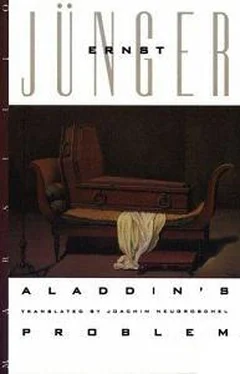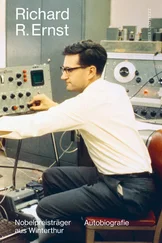79
So Phares is no magus? Then what is he? Perhaps a suggester of extraordinary power? He shows a pebble and transforms it into gold. Yet does not every pebble contain gold just as every woman contains Helen of Troy? All we have to do is advance to the godhead.
We must also ponder whether we are dealing with auto-suggestion. A deep desire projects its dream image into the world. It intensifies, supplants, concentrates reality. For the people around you, you become a pathological case, unless you convince them. They even desire this.
Genesis must be based on very ancient lore. Reading it is like looking at a new building constructed on the ruins, and with the rubble, of a pre-Babylonian palace. We can leave Jehovah aside. But the rib that could not have been made up. Adam is the perfect human being, neither male nor female, but androgynous like the angels — he had the female branch off from him as a dream image. Our desire is merely the perception of loss — a shadow of that first desire, which bore fruit.
80
A nebulous yearning for other worlds is as ancient as man himself. Today it has technological features; our expectations of alien guests and their landing have been haunting our imaginations for some time now. We must take this seriously, firstly as a symptom.
Bizarre aircraft are depicted, challenged, exposed as mirages. They serve as a bait and a mechanism for the imagination; on the other hand, they indicate wishful thinking. The automatic apparatus is consistent with the spirit of the times. The end of the world, a vision at every millennium, likewise presents itself as a technological catastrophe.
How bizarre that alien guests are expected now of all times, when astronomical investigations seem to have demonstrated that the stars not only are not, but cannot be, inhabited. This simply indicates the depth of our yearning. People feel more and more strongly that pure power and the enjoyment of technology leave them unsatisfied. They miss what used to be angels and what angels gave them.
A propos, I do not think that technology contradicts the great change. It will lead to the wall of time and it will be intrinsically transformed. Rockets are not destined for alien worlds, their purpose is to shake the old faith; its hereafter has been shown wanting.
81
My encounter with Phares was preceded by a growing disquiet or agitation. The disturbances were both optical and acoustic. We must distinguish between the external and the internal images that we regard as mirages; yet they can assume shapes that ultimately convince. In the deserts, the transition was produced by mortification of the flesh. In my case, it was involuntary; I had lost my appetite long ago. For years, I have been convinced that we are living in a desert, with technology contributing more and more to its size and monotony. And, incidentally, that the imagination is provoked by monotony.
Whenever I was writing, at the Terrestra office or, even better, at home, and I closed my eyes, the afterimage of the page and its letters appeared to my mind's eye. This is a universal experience; the script becomes illegible, it looks ornamental.
However, the sentences that appeared to me were legible, yet they did not correspond to my text — communications virtually dictated in automatic writing. They were mostly unpleasant. "Your hands are dirty" or: "The dogs are calling you." Also: "Think of Liegnitz" and: "You misunderstood Bertha." Often I could not tell whether I was hearing or reading these things.
It was the same with the visions: they followed a mental clouding that turned into daydreams. Gradually, everyday life became less persuasive and dreams more so.
I sensed a world to which Phares would lead me, and I heard his voice: "Soon you will learn what you do not know yet."
82
Why did he address me of all people? Were there contacts? I recall the Liegnitz park and my basic nihilistic mood. Nihilism must not be followed by any new idealism — it would be doomed from the very outset or it would lead, at best, into a romantic cul-de-sac. The break must be radical.
And then the world of graves. I have noticed that constant dealings with the dead lend a spiritualistic aura to even the lower forms ofwork. This aura has concentrated, perhaps partly because Terrestra succeeded as something more than simply an extension of Pietas. Graves are the beginning of humanity and not just of culture.
Be that as it may, my encounter with Phares must have been prepared, albeit in a dreamlike way. As we exchanged greetings, I already had a strong sense of déja-vu.
83
Happiness is imparted to us only fleetingly. In euphoria, time passes us without a trace; it is annihilated by high degrees of pleasure and knowledge. On the other hand, pain and time are inseparably blended. This touches on the imperfectness of Creation; the religions have recognized this. A few blame the gods, others mankind, still others fate. We live in a world without peace.
How was it that the moments of happiness in Phares's garden increased? I almost said, "expanded" — but that is not the apt word; bliss knows no measurable time.
I should have been surprised that the garden had trees and flowers, but not animals. Phares said: "We can integrate them, but we do not bother." Now whom did he mean by that "we"? Himself and his ilk or even himself and me?
If the garden had no animals — then why blossoms in their marvelous splendor, such as one senses behind the rose and the hibiscus shortly after awakening? The garden lacked bees and butterflies, for which their labella and calyxes are formed, and even the pollinating wind. Perhaps it was the fragrance that united them, or else they faced one another like magnetic mirrors. I could sense their strength even in the darkness, indeed more sharply then.
"Phares said" — but did he actually speak? I saw him move his lips, I could understand him from far away, in thunderstorms and naturally also in dreams, with my inner ear. So I do not know whether I heard him or whether he spoke. I mused about it for a long time and my guess is that he knows the primal text, of which all human as well as animal languages are merely translations or effusions. As are the rustling of forests and the murmuring of wellsprings; the souls of plants are still closest to the divine world. They convince as metaphors.
Phares probably aims at bridging, if not overcoming, dualism and reaching back through the dichotomies including the divisions into plants and animals or into sexes; but first, the foundations of good and evil had to be shaken. Then the barrier between men and gods could also collapse.
I could already feel that our encounter satisfied my nihilism. I could tell by symptoms too — especially a new affection that both surprised and delighted Bertha and me. It was as if we had never known one another before.
I noticed in general that the people I dealt with as well as strangers I encountered in the street had more to say to me than a bit earlier. And even Terrestra appeared to me, indeed in a new light, as a worthwhile task.
84
My being animated by a new spirit is something I perceive in the fact that I have jumped ahead, for I am still with my problem — say, with the decisions demanded of us by the power that streams toward us. Aladdin could limit himself to comfort; with Budur he had nothing more than a happy marriage. That is how simple minds behave: they remain untouched by stronger temptation. Even concern about society, say, "the welfare of the fatherland," on which they could focus their power, is alien to them. I thought about that, albeit only for an instant, but my nihilism leads to other considerations.
A description that designates itself as a problem can offer no solution. Deeds and images still attack one another. "I am in action," Jellicoe radioed to the Admiralty when it demanded reports from him during the naval battle.
Читать дальше












